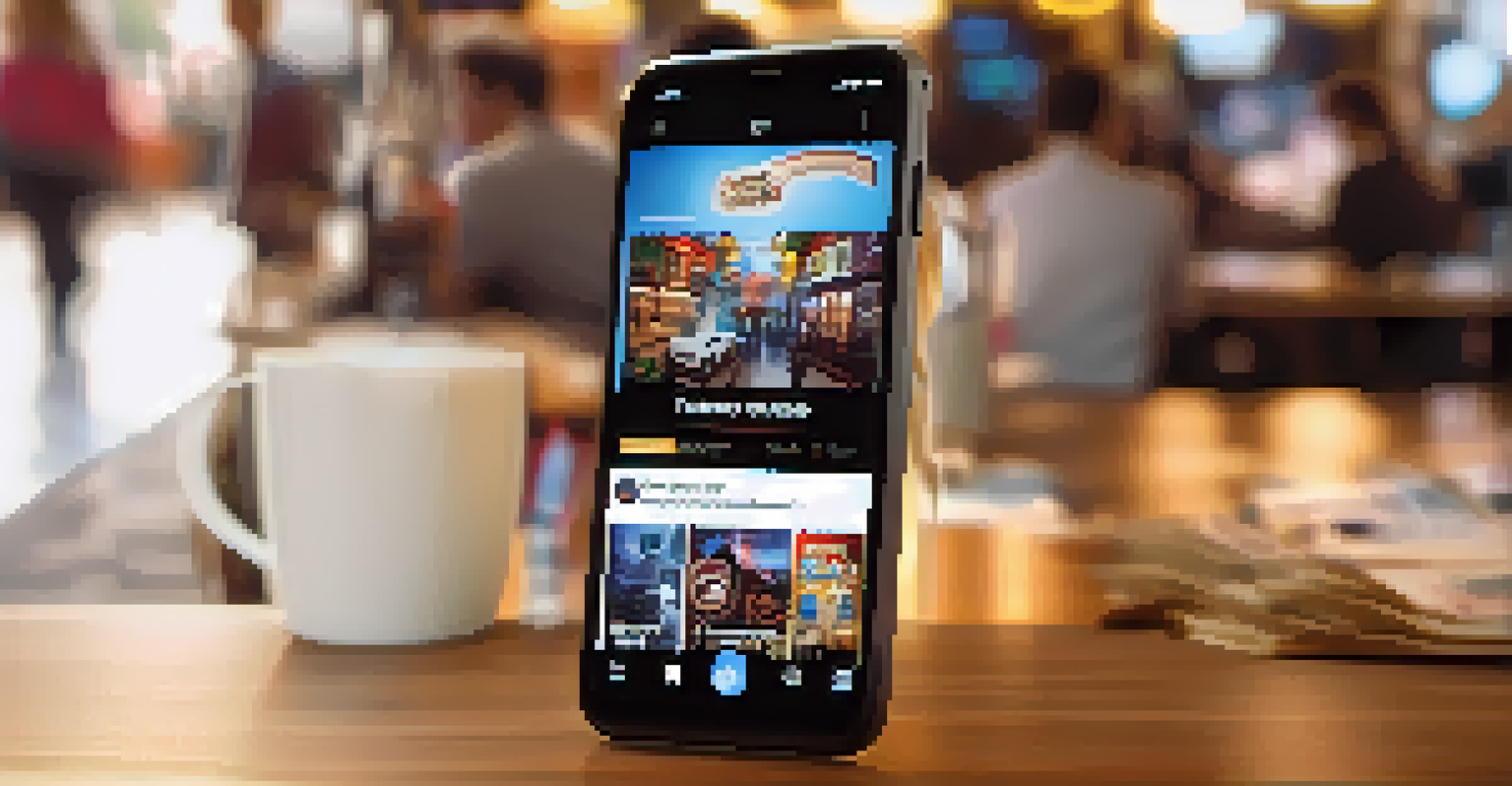Social Media Campaigns: A Case Study on Successful Films

The Power of Social Media in Film Marketing
Social media has revolutionized how films are marketed, creating direct channels between studios and audiences. Platforms like Instagram, Twitter, and TikTok allow filmmakers to engage with fans in real-time, generating excitement and anticipation. This shift from traditional advertising to interactive marketing has proven effective for many films, enabling them to reach broader audiences.
Social media is not just a tool; it’s a way to connect with your audience on a deeper level.
For instance, films can utilize teasers, behind-the-scenes looks, and cast interactions to build a community around their release. These strategies not only keep potential viewers informed but also make them feel like part of the filmmaking process. By fostering this sense of involvement, films can create a loyal fan base even before hitting theaters.
As we delve into specific case studies, we’ll see how various films successfully harnessed social media to amplify their reach and impact. The lessons learned can be invaluable for any project looking to make a mark in today's digital landscape.
Case Study: 'The Blair Witch Project' Viral Marketing
Released in 1999, 'The Blair Witch Project' is often cited as a pioneering case in viral marketing for films. The filmmakers used a minimalist website to share the mythos of the Blair Witch, creating an air of mystery and intrigue. They cleverly blended fact and fiction, leading audiences to question the authenticity of the film's narrative.

This approach generated significant buzz, with viewers discussing the film on forums and sharing its trailer through word of mouth. By the time the movie was released, it had built a massive following, leading to box office success far exceeding its modest budget. The success of 'The Blair Witch Project' shows how effective social media can be when used creatively to engage audiences.
Engagement Builds Film Communities
Social media allows filmmakers to interact with fans, fostering a sense of community and loyalty before a film's release.
This case highlights the importance of authenticity and storytelling in social media campaigns. By immersing audiences in a compelling narrative, filmmakers can spark curiosity and encourage sharing, driving organic engagement.
Case Study: 'Deadpool' and Audience Engagement
'Deadpool' took a different approach by leveraging humor and irreverence in its social media campaigns. The character's unique personality was reflected in the campaign's tone, making it highly shareable and relatable. From hilarious memes to quirky promotional videos, the campaign consistently entertained rather than just informed.
Marketing is no longer about the stuff you make, but the stories you tell.
Moreover, the filmmakers understood the importance of engaging directly with fans. The cast and crew frequently interacted with followers on platforms like Twitter, creating a sense of community and excitement leading up to the film's release. This strategy not only humanized the marketing process but also built a loyal fan base eager to support the film.
Ultimately, 'Deadpool's' success illustrates how humor and direct engagement can create a memorable social media campaign. By staying true to the film's spirit, the campaign resonated with audiences, proving that personality plays a key role in effective marketing.
Case Study: 'Get Out' and Cultural Conversations
'Get Out' utilized social media not just for promotion, but to spark conversations around its themes. The film's director, Jordan Peele, leveraged platforms like Twitter to engage with audiences about social issues depicted in the movie. This approach turned the film into a cultural touchpoint, generating discussions that extended beyond the screen.
By encouraging dialogue about race, identity, and societal norms, 'Get Out' created a deeper connection with its audience. The campaign included interactive polls, discussions, and even collaborations with influencers who shared similar values. This not only broadened the film's reach but also positioned it as a significant cultural commentary.
Authenticity Drives Successful Campaigns
Effective marketing relies on authenticity and storytelling, engaging audiences emotionally and encouraging organic sharing.
This case exemplifies the power of social media in shaping cultural narratives. By fostering meaningful conversations, filmmakers can create a lasting impact that resonates with audiences long after the credits roll.
Case Study: 'It' and Fear Factor Marketing
When 'It' was released, its marketing campaign capitalized on the horror genre's unique appeal. The film's social media strategy included creepy teasers, eerie images, and interactive content that played into the fear factor. These elements were designed to evoke curiosity and anticipation, drawing in fans of horror films.
Additionally, the campaign utilized experiential marketing, such as pop-up events in various cities, where fans could experience the film's atmosphere firsthand. This immersive approach not only generated buzz but also encouraged social sharing, as attendees posted their experiences online. The combination of suspenseful content and real-life interactions created a multi-faceted marketing strategy.
The success of 'It's' campaign demonstrates the effectiveness of tapping into emotions, particularly fear, to engage audiences. By crafting an experience that resonated with horror enthusiasts, the filmmakers ensured that the film was a topic of conversation well before its release.
Case Study: 'Black Panther' and Global Connectivity
'Black Panther' became a cultural phenomenon, in part due to its powerful social media campaign that emphasized representation and community. The marketing team focused on celebrating African culture and the film's themes of empowerment, attracting a diverse audience. They utilized platforms like Instagram to share vibrant visuals and stories that resonated globally.
Furthermore, the film's cast actively engaged with fans, participating in live Q&As and sharing personal stories about what the film meant to them. This connection not only amplified the film's message but also created a sense of unity among viewers. The campaign effectively turned the film into a movement, encouraging audiences to share their own experiences and connections.
Emerging Trends Shape Future Marketing
The evolution of technology and social media platforms will lead filmmakers to adopt innovative, personalized marketing strategies.
The 'Black Panther' case study illustrates the importance of inclusivity and representation in social media campaigns. By fostering a sense of belonging, filmmakers can inspire audiences and build a supportive community around their project.
Key Takeaways from Successful Film Campaigns
Analyzing these case studies reveals several key strategies for effective social media campaigns in film marketing. First, authenticity and storytelling are crucial; audiences respond well to campaigns that resonate with their emotions and experiences. Engaging directly with fans and encouraging dialogue creates a sense of community and loyalty.
Additionally, tapping into cultural themes or current societal conversations can enhance a film's relevance and impact. When campaigns are designed to spark discussions, they not only promote the film but also contribute to larger conversations, making them more memorable.

Finally, leveraging humor or fear can create a strong emotional connection, encouraging audiences to share their experiences online. By understanding what resonates with their target audience, filmmakers can craft campaigns that are not only successful but also meaningful.
The Future of Social Media in Film Marketing
As technology and social media platforms evolve, so too will the strategies filmmakers use to market their films. Emerging platforms like TikTok and new features on existing platforms offer fresh opportunities for engagement. Filmmakers will need to stay adaptable and innovative to capture the attention of audiences who are increasingly inundated with content.
Moreover, the trend toward personalized marketing is likely to grow. Utilizing data analytics, filmmakers can target specific demographics with tailored content that speaks directly to their interests and preferences. This level of customization can lead to higher engagement rates and more effective campaigns.
In conclusion, the future of social media in film marketing holds exciting possibilities. By embracing emerging trends and continuing to prioritize authentic engagement, filmmakers can create campaigns that not only promote their films but also connect deeply with their audiences.